Related Research Articles
The National Institute of Justice (NIJ) is the research, development and evaluation agency of the United States Department of Justice. NIJ, along with the Bureau of Justice Statistics (BJS), Bureau of Justice Assistance (BJA), Office of Juvenile Justice and Delinquency Prevention (OJJDP), Office for Victims of Crime (OVC), and other program offices, comprise the Office of Justice Programs (OJP) branch of the Department of Justice.

Experian plc is an Anglo-Irish multinational consumer credit reporting company. Experian collects and aggregates information on over 1 billion people and businesses including 235 million individual U.S. consumers and more than 25 million U.S. businesses.

Advanced driver-assistance systems (ADAS) are groups of electronic technologies that assist drivers in driving and parking functions. Through a safe human-machine interface, ADAS increase car and road safety. ADAS use automated technology, such as sensors and cameras, to detect nearby obstacles or driver errors, and respond accordingly.
The National Highway Traffic Safety Administration is an agency of the U.S. federal government, part of the Department of Transportation. It describes its mission as "Save lives, prevent injuries, reduce vehicle-related crashes" related to transportation safety in the United States.

OnStar Corporation is a subsidiary of General Motors that provides subscription-based communications, in-vehicle security, emergency services, hands-free calling, turn-by-turn navigation, and remote diagnostics systems throughout the United States, Canada, China, Mexico, Europe, Brazil, and Argentina.

The Office of Justice Programs (OJP) is an agency of the United States Department of Justice that focuses on crime prevention through research and development, assistance to state, local, and tribal criminal justice agencies, including law enforcement, corrections, and juvenile justice through grants and assistance to crime victims.
CARFAX, Inc. is a commercial web-based service that supplies vehicle history reports to individuals and businesses on used cars and light trucks for American and Canadian consumers.

The Monroney sticker or window sticker is a label required in the United States to be displayed in all new automobiles and includes the listing of certain official information about the car. The window sticker was named after Almer Stillwell "Mike" Monroney, United States Senator from Oklahoma. Monroney sponsored the Automobile Information Disclosure Act of 1958, which mandated the disclosure of equipment and pricing information on new automobiles.

The Canadian Automobile Association is a federation of eight regional not-for-profit automobile associations in Canada, founded in 1913. The constituent associations are responsible for providing roadside assistance, auto touring and leisure travel services, insurance services, and member discount programs within their service territories. The CAA National Office in Ottawa coordinates relations between the clubs, oversees joint initiatives, and lobbies the federal government. In 2020 and 2021, the Gustavson Brand Trust Index named CAA the most trusted brand in Canada.
Lemon laws are United States state laws that provide a remedy for purchasers of cars and other consumer goods in order to compensate for products that repeatedly fail to meet standards of quality and performance. Although many types of products can be defective, the term "lemon" is mostly used to describe defective motor vehicles, such as cars, trucks, and motorcycles.
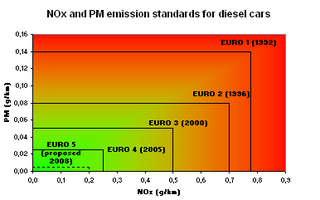
The European emission standards are vehicle emission standards for exhaust emissions of new vehicles sold in the European Union and EEA member states. The standards are defined in a series of European Union directives staging the progressive introduction of increasingly stringent standards. Details of Euro 7, the final standard, will be announced in 2021 and probably come into force in 2025, before the phase-out of fossil fuel vehicles takes place to further limit climate change and air pollution in Europe. It is likely that manufacturers in the United Kingdom will also follow Euro 7, as they did the earlier standards. The details of Euro 7 are likely to be influenced by European Green Deal targets to reduce carbon dioxide emissions.

The Florida Highway Patrol (FHP) is a division of the Florida Department of Highway Safety and Motor Vehicles. It is Florida's highway patrol and is the primary law enforcement agency charged with investigating traffic crashes and criminal laws on the state’s highways.
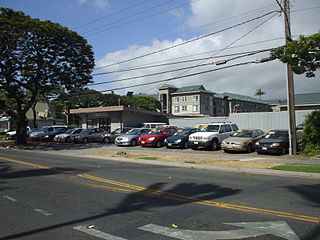
A used car, a pre-owned vehicle, or a secondhand car, is a vehicle that has previously had one or more retail owners. Used cars are sold through a variety of outlets, including franchise and independent car dealers, rental car companies, buy here pay here dealerships, leasing offices, auctions, and private party sales. Some car retailers offer "no-haggle prices," "certified" used cars, and extended service plans or warranties.
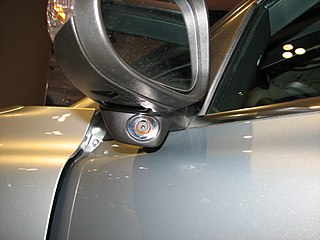
The blind spot monitor or blind-spot monitoring is a vehicle-based sensor device that detects other vehicles located to the driver’s side and rear. Warnings can be visual, audible, vibrating, or tactile.
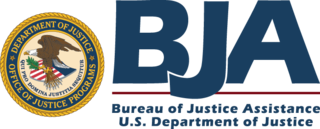
The Bureau of Justice Assistance (BJA) is a component of the Office of Justice Programs, within the United States Department of Justice. BJA provides leadership and assistance to local criminal justice programs that improve and reinforce the nation's criminal justice system.
The Bureau of Justice Statistics (BJS) of the U.S. Department of Justice is the principal federal agency responsible for measuring crime, criminal victimization, criminal offenders, victims of crime, correlates of crime, and the operation of criminal and civil justice systems at the federal, state, tribal, and local levels. Established on December 27, 1979, BJS collects, analyzes, and publishes data relating to crime in the United States. The agency publishes data regarding statistics gathered from the roughly fifty-thousand agencies, offices, courts, and institutions that together comprise the U.S. justice system.
To collect, analyze, publish, and disseminate information on crime, criminal offenders, victims of crime, and the operation of justice systems at all levels of government. These data are critical to Federal, State, and local policymakers in combating crime and ensuring that justice is both efficient and evenhanded.

The Car Allowance Rebate System (CARS), colloquially known as "cash for clunkers", was a $3 billion U.S. federal scrappage program intended to provide economic incentives to U.S. residents to purchase a new, more fuel-efficient vehicle when trading in a less fuel-efficient vehicle. The program was promoted as a post-recession stimulus program to boost auto sales while putting more fuel-efficient vehicles on the roadways.
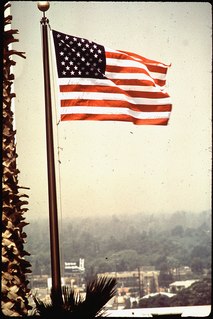
The California Smog Check Program requires vehicles that were manufactured in 1976 or later to participate in the biennial smog check program in participating counties. The program's stated aim is to reduce air pollution from vehicles by ensuring that cars with excessive emissions are repaired in accordance with federal and state guidelines. With some exceptions, gasoline-powered vehicles, hybrid vehicles, and alternative-fuel vehicles that are eight model-years old or newer are not required to participate; instead, these vehicles pay a smog abatement fee for the first 8 years in place of being required to pass a smog check. The eight-year exception does not apply to nonresident vehicles being registered in California for the first time, diesel vehicles 1998 model or newer and weighing 14,000 lbs or less, or specially constructed vehicles 1976 and newer. The program is a joint effort between the California Air Resources Board, the California Bureau of Automotive Repair, and the California Department of Motor Vehicles.
On September 26, 2011, California Governor Jerry Brown signed California Law AB 1215 into law. Authored by Bob Blumenfield, the legislation accomplished three goals: (1) increasing the fees that California car and truck dealers can charge for licensing, (2) requiring dealers to use Electronic Titling and (3) governing how automobile dealers disclose previously damaged used cars. The law went into effect on July 1, 2012.
VIN cloning or car cloning is a practice of using a vehicle identification number (VIN) from a legally registered car to hide the identity of a stolen or salvaged vehicle. The procedure involves replacing the serial plate of a stolen or salvage repaired vehicle with a plate containing the number of a validly registered vehicle of similar make, model and year from another state, province or country.
References
- ↑ "National Motor Vehicle Title Information System (NMVTIS) – For Consumers | BJA". Bureau of Justice Assistance (BJA). Retrieved 2020-02-10.
- ↑ "National Motor Vehicle Title Information System (NMVTIS) – Understanding an NMVTIS Vehicle History Report | BJA". Bureau of Justice Assistance (BJA). Retrieved 2020-07-21.
- ↑ "What is the NMVTIS and why should I care?". 2020-02-06. Retrieved 2020-02-10.
- ↑ "National Motor Vehicle Title Information System (NMVTIS)". Federal Register. 2009-01-30. Retrieved 2020-02-10.